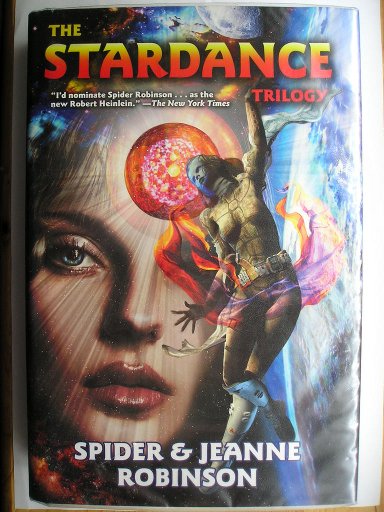
The novel “Starmind” by Spider and Jeanne Robinson was published for the first time in 1994 in the magazine “Analog Science Fiction” and in 1995 as a book. It’s the sequel to “Starseed” and the third novel in the Stardance trilogy.
Rand Porter is a composer who is offered his dream job in the artistic direction of the Shimizu Hotel, the luxurious hotel in the Earth’s orbit. The problem is that his wife, the writer Rhea Paixao, is very attached to her hometown so to say the least has some hesitation to leave it to move so far as to the Earth’s orbit.
Eventually, the couple agrees to try to live a period at the Shimizu Hotel so they move with their daughter. Soon the situation becomes much more complex than expected with assassination attempts that initially appear to target some billionaires. Soon the target appear to be those who want to participate in the Stardance and join with a symbiotic life form or who have already achieved the symbiosis.
In “Starmind”, Spider and Jeanne Robinson make another leap forward in time. Human beings seem to have reached a situation of unprecedented prosperity, also thanks to the Starmind, the union of the Stardancers. However, people who choose the symbiosis are a small minority and most of humans keep on living normally, but can enjoy peace.
“Starmind” is set mainly in the orbital hotel Shimizu, where Rand Porter goes to work. There, he can be fully realized at the professional level and has a beautiful family, instead his relationship with his wife deteriorates rapidly. As if that wasn’t enough, he gets involved in an assassination attempt and things become even more complicated.
In some ways, “Starmind” repeats the themes developed in the two previous novels, unfortunately, it does that in a way that makes it repetitive, adding little. This novel is centered around the story of Rand Porter and Rhea Paixao’s family and they get in the middle of something much bigger than they expected to find at the Shimizu Hotel.
I think the main problem of “Starmind” is that a good part of a novel about the fate of humanity is about to the marriage problems of the couple of protagonists. Frankly I found their story rather trivial, a mediocre melodrama based in some cases even of pettiness.
I must say that in general I tend to find family stories based on common problems boring, so in “Starmind” the protagonists’ story really impressed me for its triviality. It’s an important part of the novel so it weighs in a way that for me was quite annoying.
In the end, between that story and the revival of some themes and some characters already seen in the previous novels, the only really significant part of “Starmind” is its ending. Everything else ends up looking like a filler mostly even not directly connected to the ending.
Basically, Spider and Jeanne Robinson could very well simply write a novella or even a novelette to end the Stardance saga without losing anything significant. It seems clear that the intent was to build on the success of the two previous novels to sell the third one and create a trilogy.
Unlike the previous novels, “Starmind” is narrated in the third person. It especially follows Rand Porter and Rhea Paixao’s story but sometimes other characters as well. In this way, for the authors it’s easier to develop various characters. The pace of the narrative tends to be slow but it could be just my impression due to the heaviness of the protagonists’ family story.
In my opinion, “Starmind” has definitely more flaws than merits. It gives a conclusion to the Stardance saga so it’s worth reading it if you really want to know how it ends or if you bought the whole trilogy, otherwise forget it.


Permalink